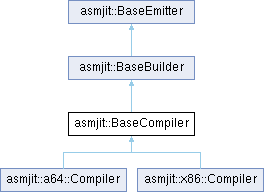asmjit::BaseCompiler Class Reference [¶]

Code emitter that uses virtual registers and performs register allocation.
Compiler is a high-level code-generation tool that provides register allocation and automatic handling of function calling conventions. It was primarily designed for merging multiple parts of code into a function without worrying about registers and function calling conventions.
BaseCompiler can be used, with a minimum effort, to handle 32-bit and 64-bit code generation within a single code base.
BaseCompiler is based on BaseBuilder and contains all the features it provides. It means that the code it stores can be modified (removed, added, injected) and analyzed. When the code is finalized the compiler can emit the code into an Assembler to translate the abstract representation into a machine code.
Check out architecture specific compilers for more details and examples:
- x86::Compiler - X86/X64 compiler implementation.
- a64::Compiler - AArch64 compiler implementation.
